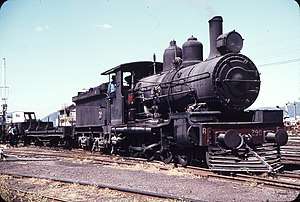Queensland B15 class locomotive
The Queensland Railways B15 class locomotive was a class of 4-6-0 steam locomotives operated by the Queensland Railways.
| Queensland Railways B15 class | |||||||||||||||||||||
|---|---|---|---|---|---|---|---|---|---|---|---|---|---|---|---|---|---|---|---|---|---|
 B15con 290 working as a shunter in Rockhampton c.1966 | |||||||||||||||||||||
| |||||||||||||||||||||
| |||||||||||||||||||||
| |||||||||||||||||||||
History
In 1889 the first B15 class locomotives built by Nasmyth, Wilson & Co entered service. Further orders from Evans, Anderson, Phelan & Co, Yorkshire Engine Company and Walkers Limited saw the class total 92 by 1899. Per Queensland Railway's classification system they were designated the B15 class, B representing they had three driving axles, and 15-inch (381 mm) diameter cylinders. A further six were acquired In 1919 when the Queensland Railways took over the Chillagoe Railway & Mining Co.[1][2][3]
Problems with broken rails saw three sets of 45-inch (1,143 mm) driving wheels acquired from the South Australian Railways and fitted to 336 at North Ipswich Railway Workshops in November 1900. Judged a success, most others were fitted over the next 30 years. They spent most of their life operating out of Cairns.[1][2][3][4]
Preservation
- 290 at the Workshops Rail Museum
- 299 at Maryborough station[4]
References
- Armstrong, John (1985). Locomotives in the Tropics Volume 1. Brisbane: Australian Railway Historical Society. pp. 58–63, 101, 102. ISBN 0 909937 13 3.
- Turner, Jim (1997). Australian Steam Locomotives 1896-1958. Kenthurst: Kangaroo Press. p. 22. ISBN 086417778X.
- Oberg, Leon (2010). Locomotives of Australia 1850s-2010. Dural: Rosenberg Publishing. pp. 86/87. ISBN 9781921719011.
- Clark, Peter (2012). An Australian Locomotive Guide. Rosenberg Publishing. p. 50. ISBN 9781921719554.